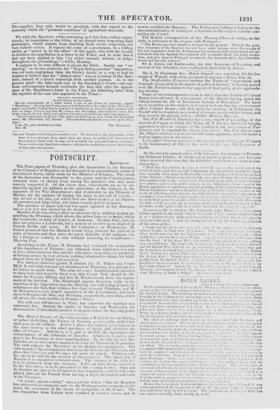The ihtuihri,/ Gazette of the 16th contains a Rayal decree
modifying, or rather abolishing, the Fueros of Navarre, pri.visi.qoally, until a law shall pass on the subject. Article 1 places the military sagvegnment on the same footing as the other produces of Spain, :ilia abolishes the office of Viceroy. Articles 2, 3, 4, and 5, abolish the supremacy and independence of the tribunals of Navarre. Articles 6, 7, and 8, em- power the Navarrese to elect municipalities. By the llth. the live Me- rindades are to elect seven members to form line'Provincial D)putation. The ISth subjects the Navarrese to tile Quinta or conscription. The 19th transfers the customhouse line from the Elir■a to the Pyrenees, and gives San Sehaslian and Passages for ports of export. Tobacco, salt. &c. are to lie sold the account of Covernmem, The direct tax of Navarre is to itmottut to 1,Stallon rids, The interest of its debt, Sc. is to he deducted flout the customs. A latv on those bases, agreed to by the Navarrese, is to be presented to the ensuing Cortes. limn and its districts are also to he included in t itese regulations, which will com- pletely shut out the French from having a dopt'tt for contraband trade in the Pyrenees.
" It would appear certain," says a private letter, "that the Regency had addressed an energetic note to the Portuguese Government, to de- mand the execution of the treaty of navigation of the Douro. The last despatches from Lisbon were couched iu evasive terms, and in
nowise satisfied the Regency. The Portuguese Cabinet relied upon the unconstitutionality of coining to a decision on the subject without con- sulting the Cortes.
The Madrid correspondent of the Morning Chronicle writes, on the 16th, in reference to the dispute with Portugal- " The Douro question slumbers, at least Mr the present. Though the posi- tive intention of the Regency has not been made known elites the receipt of the last despatches from the Portuguese Government, still strong hopes are en- tertained that the Spanish Government will reconsider their ton hasty resolu- tion, and give time to Portugal to concede the demands made, in a constitu- tional and friendly manner." Sir A. Aston, our Ambassador, the first Secretary of Legation, and several of the Attacbiis, were confined to their beds by illness.






















 Previous page
Previous page